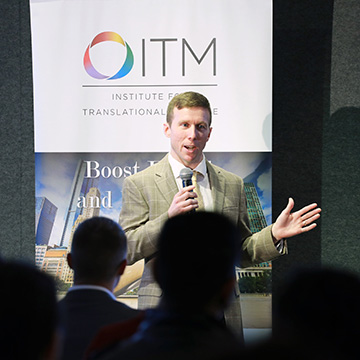Simplifying Pediatric Cancer Research with Storytelling
K12 Scholar Kevin McNerney Explores the Art of Science Communications
When a patient relapsed after years of treatment and a stem cell transplant, Kevin McNerney could feel hope dwindling. The odds his patient would live to adulthood were now just 1 in 5.
With few options remaining, the young leukemia patient and his family opted to take part in a clinical trial, a one-time immunotherapy infusion that included a synthetic receptor designed to identify cancer cells, enabling the body’s immune system to target and kill them.
“When we checked a month after the infusion, he didn't have any disease,” McNerney said during a recent TED-style talk. “And now, years later, he's still alive. Disease free.”
For McNerney, MD, MS, assistant professor of Pediatrics in the Division of Hematology, Oncology, and Stem Cell Transplantation, the experience solidified his goal of becoming a physician-scientist. It also drove his desire to study new therapies using chimeric antigen receptor (CAR) T-cells, a relatively new type of immunotherapy used to treat blood cancers. The treatment is a “living drug,” made from a patient’s own cells, which are first removed and then genetically modified in the lab to become cancer fighting cells, and then grown to large numbers. When they’re given back to the patient, the CAR T-cells engage in a lifelong mission.

It was a good exercise to practice simplifying ideas down to their core and trying to communicate them in an easily understandable way that is engaging.”
“One of the cool things is that once they kill a cancer cell, unlike a bumblebee that stings and then dies immediately after, these cells go on living and killing other cancer cells,” said McNerney. “The first pediatric patient was infused 12 years ago but still has detectable CAR T-cells in their blood.”
For patients, like the one described at the beginning of McNerney’s presentation, remission rates are now near 90 percent. There are also other benefits of a more focused treatment plan as generic approaches can produce long-term complications for pediatric patients.
McNerney took part in the TED-style Eureka Talks event as a Career Development Scholar at Northwestern University Feinberg School of Medicine. The event is a collaboration of Chicago’s three Clinical and Translational Science Award hubs — The NUCATS Institute, ITM, and CCTS. Led by ITM, participants are equipped with the skills and knowledge to effectively and confidently present their science to nonexpert audiences in various settings, such as a formal public lecture.
McNerney, who is also a member of the Stanley Manne Children’s Research Institute and Robert H. Lurie Comprehensive Cancer Center of Northwestern University, was one of three presenters, each representing a CTSA hub.
“It was a good exercise to practice simplifying ideas down to their core and trying to communicate them in an easily understandable way that is engaging,” said McNerney. “My favorite part of the event was hearing how the audience received the three talks; getting their perspective on what worked and what didn’t was very useful.”
McNerney credits his time as a K12 scholar with allowing him to take coursework on epidemiology, biostatistics, and leadership through The Graduate School at Northwestern. The award has also provided him the opportunity to continue his research pursuits. McNerney currently has a clinical trial under review and has published numerous articles in the past year.
“My research is informed by patients that I’ve taken care of who have gotten very sick from toxicities that I believe are potentially preventable. We have available therapies — often unstudied in pediatrics — that I believe have the potential for reducing severe side effects.”
Research reported in this publication was supported, in part, by the National Institutes of Health's National Center for Advancing Translational Sciences, Grant Number K12TR005104. The content is solely the responsibility of the authors and does not necessarily represent the official views of the National Institutes of Health.
Written by Roger Anderson




